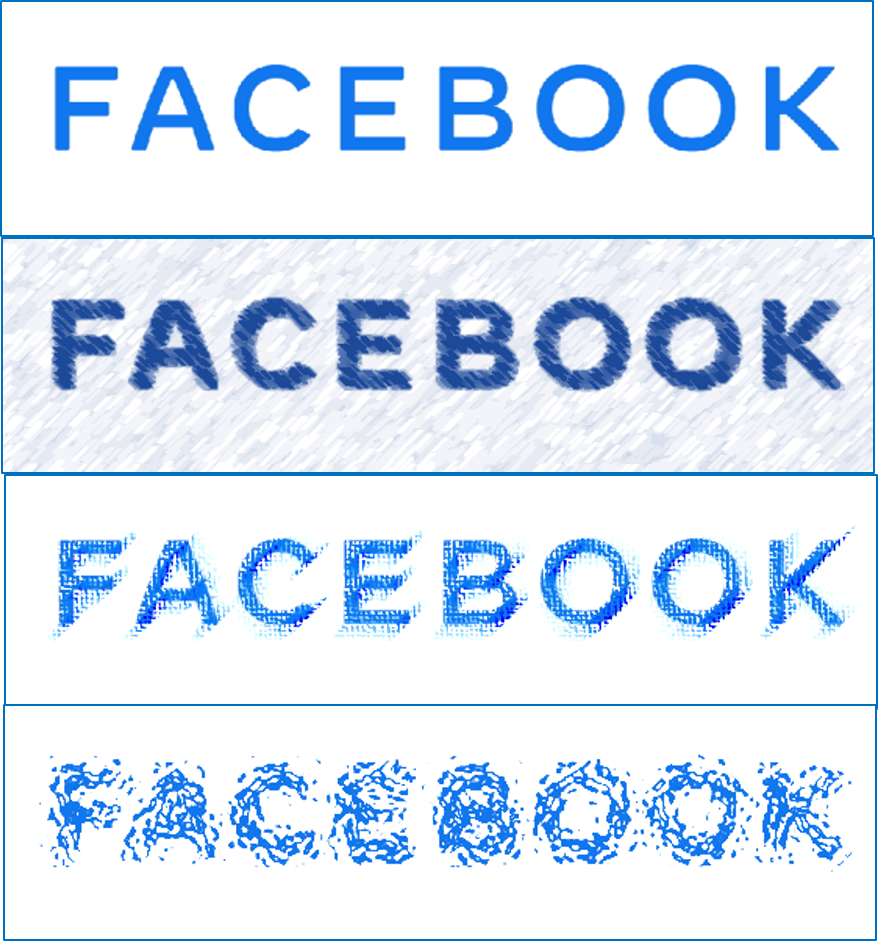
One of the best things about writing a blog like this – as often as I do – is that there are so many posts, you (hopefully) forget the ones that were lame, trivial, or just plain delusional, and instead, remember the ones that resonated for you.
But even if that’s not always the case, the fact is that there’s very little accountability for JacoBLOG. I write ’em, post ’em, socialize ’em, and respond to your comments. Sometimes there’s considerable feedback, and a diversity of opinions. At other times, the posts go quietly into the webosphere.
Generally though, I’m not especially accountable. So, maybe it’s a smart thing for me to occasionally dredge up old posts that made some sort of point, and see how well they’ve help up.
And I don’t need to go back too far in time to check my work. Late last month, I wrote a post ominously titled, “How To Redesign Your Radio Station’s Logo (Please Don’t Call Me),” in which I admitted logo design is not my strong suit.
I noted that many brands – often tech companies – are known for logo reboots. And I made the point that a great logo “is a visual representation of stability, consistency, knowing what you stand for, and being true to your values.”
So, wouldn’t you know it, one week later, Facebook changed its logo to a bold new version where its name is spelled out in all capital letters:
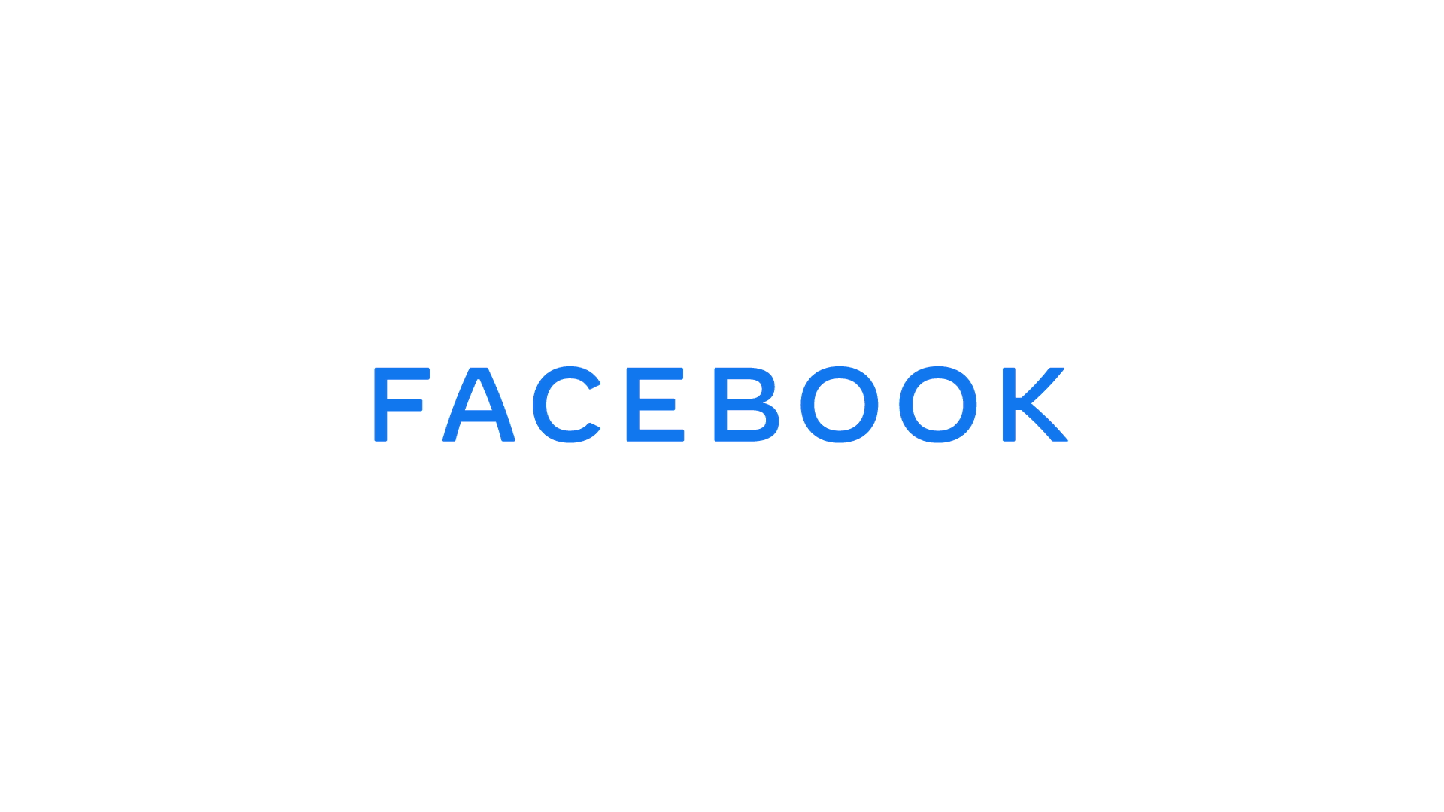
In its release, Facebook indicated the new look was “designed for clarity.”
Most critics, however, took exception. A typical thumbs-down response came from Business Insider’s Juliana Kaplan. In a story titled, “Hey Facebook about the new logo: All caps are ugly, shouty, and anti_Gen-Z,” Kaplan made the point this “capslock” style actually makes the logo harder to read. She added the new look is a turn-off to young generations, already disenchanted with Facebook.
As you might imagine, social media lit up after Facebook announced its logo facelift.
If you weren’t aware, I’ve now rebranded myself to CALUM MAILER. I’ll still be keeping up my generally awful reputation though #FacebookLogo
— Calum Mailer (@Kalcium_Kid) November 6, 2019
Many opined that those block letters reinforce Facebook’s bombastic, all-seeing, all-knowing reputation – a reputation that has clearly lost some of its mojo in in the past couple years. In Interbrand’s rankings of the “Best Global Brands” recently released, Facebook fell out of the 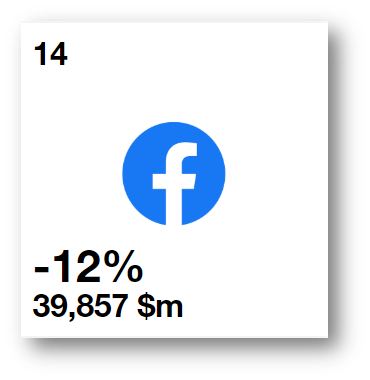 top 10, dropping from 9th to 14th.
top 10, dropping from 9th to 14th.
So, is this the time to start messing with your logo? And at a time when everything Facebook is doing is over-scrutinized by everyone – critics, teens, Congress, your mother-in-law, it makes you wonder about the wisdom of rocking the boat right about now.
In case you’re wondering, the top five:
- Apple
- Amazon
- Microsoft
- Coca-Cola
Our other topic that garnered a great deal of reaction was the brewing war between Boomers and Gen Zs – summed up by the digital eyeroll:
OK boomer.
A couple weeks back, “OK, Radio, Let’s Not Get Caught Up In #OKBoomer” talked about this new comeback Gen Z started using to respond to lame, condescending, or just plain dumb Baby Boomer behavior.
As you’ve no doubt witnessed in your journeys around the worldwide web, the phrase has indeed caught on, giving young people a much-needed rallying cry against a generation that has been bigfooting them in all sorts of arena, from the job market to college loans to even hogging the best seats at concerts and sporting events.
So, wouldn’t you know it, there’s been no shortage of stories that might best be labeled “Boomers Behaving Badly.”
And they’re both related to radio.
The first involves WHAM/Rochester talk host, Bob Lonsberry. Perhaps it was a slow day or Lonsberry was just hoping to get those studio lines ringing, but he posted this tweet (later deleted):
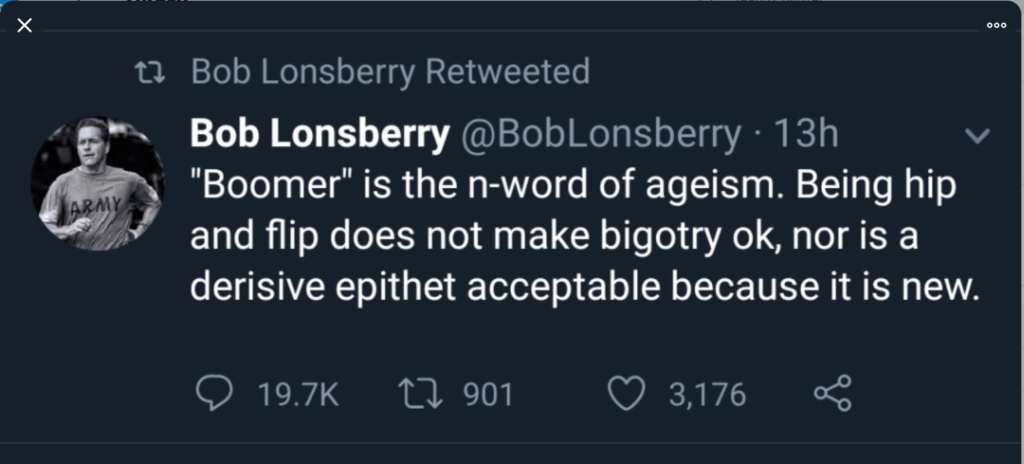
The local newspaper, The Democrat and Chronicle, jumped all over the talk host, as did a non-stop torrent of angry social media posts, numbering in the 20,000 zone.
Journalist Ryan Miller referred to Lonsberry as the “poster adult” for the OK boomer movement. I couldn’t have said it better.
The tweet sparked outrage from Stephen Colbert to Dictionary.com, who reminded the erstwhile radio host that the n-word is one the most heinous words in their vast warehouse of words.
Boomer is an informal noun referring to a person born during a baby boom, especially one born in the U.S. between 1946 and 1965.
The n-word is one of the most offensive words in the English language. https://t.co/30OAf7N83e
— Dictionary.com (@Dictionarycom) November 4, 2019
But of course, the radio host garnered tons of attention, just in time for the fall book.
Speaking of ratings, there were the headlines that blared from numerous industry trades yesterday, covering a new Nielsen report.
The one that jumped at me came from Radio Ink (but others were in the same zone), specifically their email alert subject line:
Report: Majority Of Teens Still Listening To The Radio
I bet that got your attention. It sure got mine. Until you read the fine print about this Nielsen study:
Despite reports that young consumers are spending more time with streaming platforms, social media and YouTube, Nielsen says 91% of teens (12-17) in small and medium markets are tuning into radio on a monthly basis.
That’s right – we’re talking diary markets only. And somehow, the notion of cume – once thought to be weekly – has now been extended to monthly. That lowers the bar considerably, which is clearly one of the goals. If you’re just casually reading the headlines of the day in radio, the “fact” the teen erosion is being debunked (sort of) by the industry’s official research yardstick, the ratings company of record.
Radio continues to be a powerful medium in this country and in pop culture. Despite myriad new competitors and disruption galore, 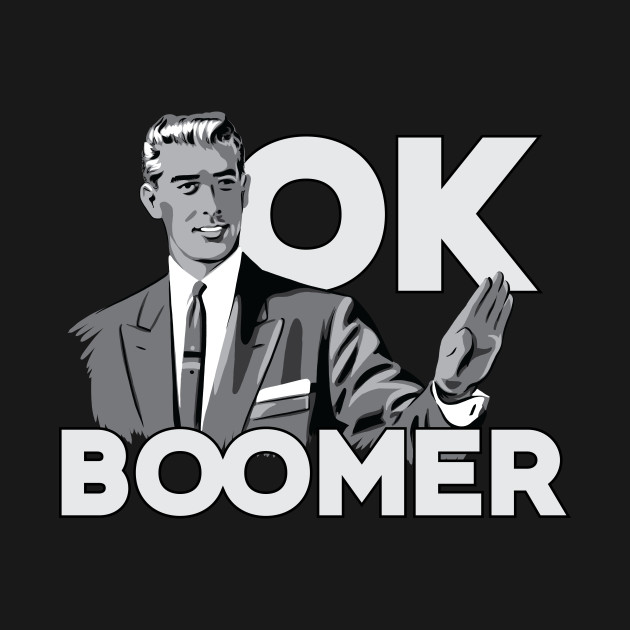 broadcast radio of all stripes – commercial, public, Christian – has strong presence, influence, and impact throughout the country. But when research reports (perhaps written by Boomers) seek to glorify and exaggerate Gen Z reach, it’s a bridge too far.
broadcast radio of all stripes – commercial, public, Christian – has strong presence, influence, and impact throughout the country. But when research reports (perhaps written by Boomers) seek to glorify and exaggerate Gen Z reach, it’s a bridge too far.
The irony is that expanded teen listening and engagement is more than just possible, it’s doable – if broadcasters applied some of the same principles to attracting them they do for those coveted 25-54 year-olds.
Of course, it starts with research. But I cannot remember the last time I participated in a music test or perceptual study where Gen Z teens were included, forget 6-11 year-olds (which Nielsen measure in the biggest PPM markets).
If the industry continues to devalue this generation, excluding them from research, programming, sales, and marketing activities, then why continue to tout their listenership?
That’s precisely the exploitative, condescending, and outdated attitudes the phrase refers to. It was also typified by SVP/editorial director of AARP (how appropriate), Myrna Blyth, who declared in an interview with Axios earlier this week:
“OK, millennials. But we’re the people that actually have the money.”
AARP later apologized for her statement.
OK boomer.
- Traveling At The Speed of CES - January 10, 2025
- The One Thing Missing At CES? - January 9, 2025
- AI Your Commercials - January 8, 2025




It’s not possible to convince a monkey to give you a banana by promising it infinite bananas when they die. -Jayla Leon